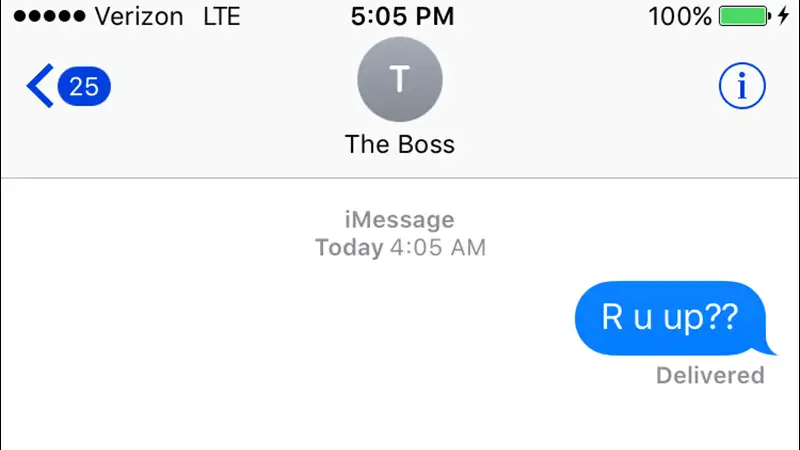If You Ever Have to Text Your Boss, Read This First

Texting is great if you want to confirm lunch plans with a friend, or ask your spouse to pick up something from the store on the way home. But how about texting your boss, or even the hiring manager for a job you’re trying to get?
According to CareerBuilder.com’s annual job survey, roughly four in 10 employers said they plan to use text messaging to schedule interviews, and a growing number of companies that rely on shift workers are turning to startups that have developed platforms where employees can communicate with each other and their supervisors via text.
As more members of the smartphone generation make their way into leadership positions, career-development experts predict that texting will become a more prominent and widely accepted method of communication.
“We’re going to see more and more of that as these younger, digitally savvy employees appear in the workplace,” says Jim Link, chief human resources officer at Randstad North America.
In other words, if you’ve never gotten a text from your boss before, it’s probably just a matter of time.
As with email, there are some definite dos and don’ts when it comes to workplace texting. Here’s what experts have to say about doing it right.
Respect people’s boundaries. You really, really want to avoid peppering colleagues with text messages outside of regular work hours, says career coach Crystal Marsh. “Texting after work hours should be reserved for something that needs urgent attention,” she says.
Follow a higher-up’s example. A lot of how you end up communicating via text should reflect how your boss uses the medium. You never want to be less formal than they are, but you can and should follow their lead as an indication of what construes acceptable work texting in your company culture. They capitalize and punctuate formally? So should you. If they’re more haphazard, you have a bit more slack yourself.
“If this is a peer, it doesn’t necessarily have to be quite as formal as it would be with your boss, assuming you have a rapport with that person,” Marsh says. “For a job seeker, you’re going to use it to be more responsive than to initiate texts yourself.” It would never be appropriate, she says, for a candidate to pester a hiring manager via text for feedback or updates on their application.
Keep it short. Getting a blitz of messages for overly-long text communication is annoying, and you increase the risk that someone misunderstands you if they reach the recipient out of order. “Communicate that you’re expecting an outcome or a result. Identify who you are, and give a short summary — the facts presented without emotion and too many adjectives,” Link says.
If you can’t keep it short, consider if text is really the best method for what you’re trying to get across, Marsh says. You might be better served with an email or even a face-to-face conversation.
In general, texting is best to handle issues that are important primarily in the short term. Need to reschedule a videoconference? You can handle that with a text. Want to give someone constructive criticism on their work? Save that for email or your next meeting.
Embrace abbreviations — within reason. It’s OK to abbreviate in text — as opposed to email — since the medium’s brevity is one of its main assets. But experts draw a distinction between traditional abbreviation and using letters and numbers instead of actual words. In other words, skip “cu l8r” as a signoff if you’re texting for work.
“You’re not going to be abbreviating like a teenager,” Marsh says. And on a related note, go easy on the exclamation points, she adds.
Skip the funny stuff. Please, no emoji. Just don’t go there. Also, don’t try to be a comedian. It’s hard enough conveying humor effectively via email; the truncated format of texting multiples the chances of someone misconstruing your message and possibly getting upset.
“It’s very, very easy to cross boundaries through text messages. It shouldn’t be used for jokes,” Marsh says.
“So many people take for granted that they can communicate at work the way they communicate with their friends. That’s not the way to go,” Link says.
